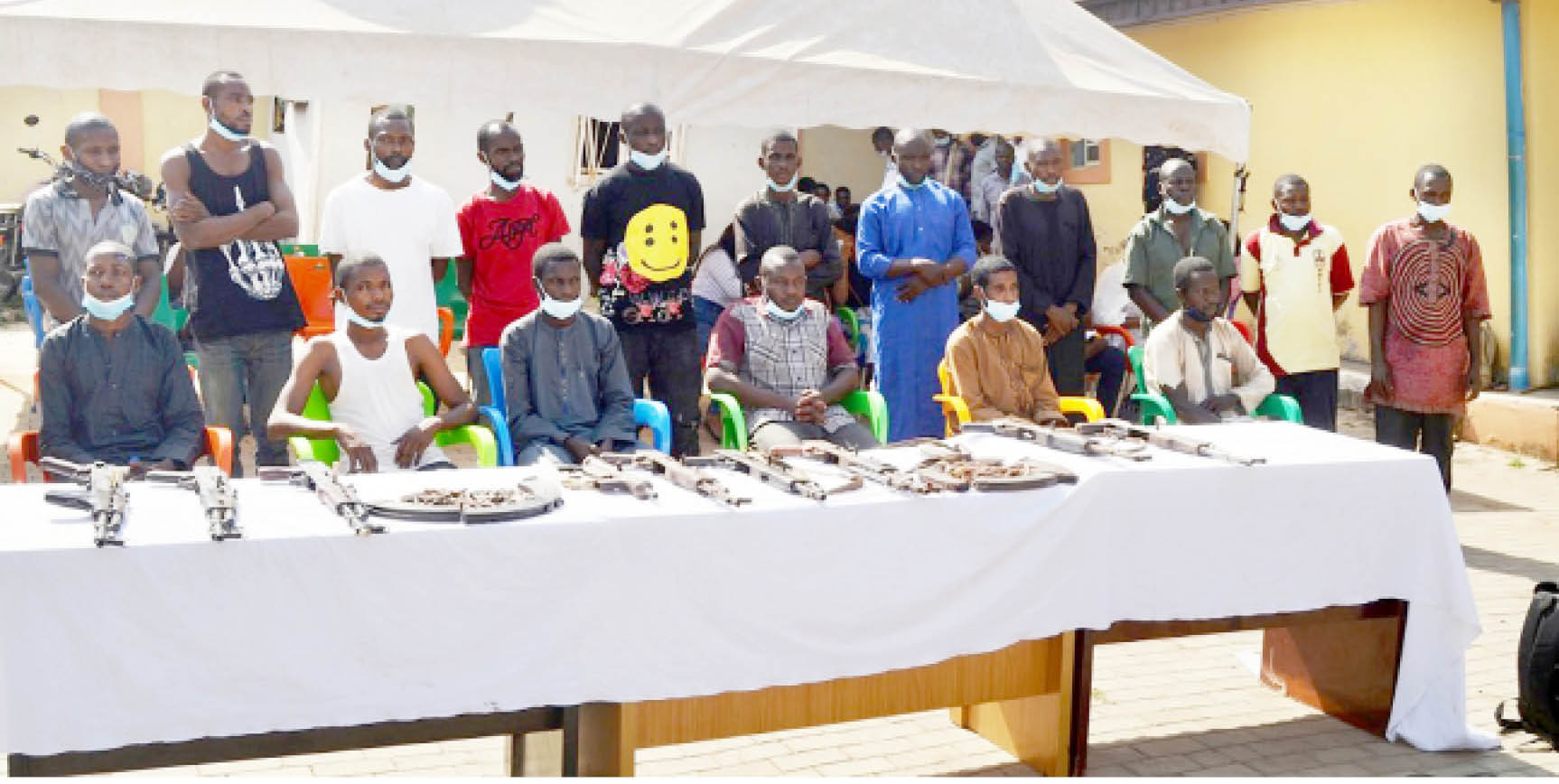Despite efforts by security forces, violent crimes are on the hike pointing to availability of small and light weapons in the country. Experts attribute this trend to large unmanned borders.
Proliferation of arms, occasioned by illegal and porous borders and booming business of gun-running, is fuelling Nigeria’s security challenges, giving rise to criminal activities across the country.
- What bandits commanders told me in Zamfara forests Sheikh Gumi
- Top bandits commander, Buharin Daji, to lay down arms soon Matawalle
Investigations by Daily Trust show a spike in cases of banditry, kidnapping, ethnic conflicts, cult clashes, among others, with perpetrators relying on increased availability of small arms, according to experts.
Nigeria occupies an area of 923,768 square kilometers, extending to 1,127 km east-west and 1,046 km north-south. It is bordered by Chad on the north-east, Cameroon on the east, Gulf of Guinea on the south, Benin Republic on the west and Niger on the north-west.
With a total boundary length of 4,900 km, of which 853 km is coastline, the country’s borders with Benin and Chad are 773km and 87km long respectively, while those with Niger and Cameroon span 1, 497km and 1 690km respectively.
The Nigeria Immigration Service (NIS), in 2014, through its then comptroller-general, David Parradang, revealed that although the country had 84 approved borders, there were over 1,400 illegal routes.
Parradang, who made the disclosure while addressing the National Conference Committee on Immigration, cited the examples of Ogun and Adamawa states, with 83 and 80 illegal posts respectively.
Experts who spoke with Daily Trust said the porous nature of these borders had aided arms proliferation in the country, leading to the spread of terrorist activities and other security challenges.
Daily Trust reports that aside smuggling of arms and ammunitions, criminals also routinely attack security personnel and formations, to steal arms.
Security experts who spoke to our reporters particularly contended that the vulnerability of the borders to the spread of Boko Haram insurgency was compounded by the fact that Niger and Cameroon had borders with the northern Nigerian states, where Boko Haram already exerts a strong influence.
“The border with Niger, for example, stretches along Sokoto, Katsina, Jigawa and Yobe states. This proximity to northern Nigeria is, therefore, a particular threat to Niger’s already fragile security, given the relative ease with which terrorist elements can cross into the country,” said a security expert who craved anonymity.
In August 2019, the federal government announced closure of Nigeria’s land borders to check activities of smugglers and gun runners, and allow local production of some agricultural produce to thrive.
There have been concerns over widespread illegal arms across the country. The National Task Force (NATFORCE) to combat the illegal importation, smuggling of goods, small arms, ammunition and light weapons, in 2019, said the proliferation of small arms and light weapons was one of the major security challenges facing Nigeria, Africa, and indeed, the world in general.
This was contained in a submission by its director-general, Chief Osita Okereke, to the National Assembly to ratify a bill for a National Commission for the Prohibition of all Illegal Importation of Small Arms, Ammunition and Light Weapons.
Okereke said the trafficking and wide availability of these weapons fuelled communal conflicts, political instability and pose a threat, not only to national security, but also to sustainable development. He pointed out that “the widespread proliferation of small arms is contributing to alarming levels of armed crimes and militancy” and there is an urgent need to ratify the bill for the establishment of the commission.

With little or no action to avert the inflow of those light weapons, Nigeria is witnessing a surge in gun-induced crimes, according to survey by this newspaper.
But announcing plan to reopen the borders in November, Finance Minister, Zainab Shamsuna Ahmed, said the country has made a success of the ban on movements across the borders.
“The objective has been met in the sense that we have been able, over these couple of months, to work together with our partners in a tripartite committee and do a joint border patrol together and reinforce the sanctity of the commitments that we made to each other,” she said.
Yesterday, our sister publication, Daily Trust reported heightened tension and scare across the country due to activities of armed criminals.
Activities of armed marauders in the north-western states of Zamfara, Katsina and Kaduna is ceaseless, with a massive infiltration into Niger State. On Monday, an attack on communities in Shiroro Local Government of the state led to the death of at least 21 persons and displacement of some 300 villagers.
Arms seizure, a rising trend
Although arms seizure in Nigeria is not a new phenomenon; it has been on the rise in the last five years, checks by Daily Trust have shown. For instance, the Nigeria Customs Service (NCS), in 2017, recorded the seizure of shipments of 2,761 pump action rifles and said all the four shipments intercepted from Turkey were false declarations on the bills of landing, showing a case of smuggling.
Still in March, 2017, the NCS intercepted a container load of arms and ammunition at a bonded terminal ‘ports and cargo terminal’ of the Tin Can Island ports.
Sources at the Zone A unit of the NCS had said the cargo of 440 guns was shipped in from Turkey. The consignment was earlier declared as white cement. In all, Customs said it seized nearly 4,000 guns in the various operations and catchment of cartridges at its Niger/Kwara/Kogi command.
In January, 2018, a container loaded with 49 boxes of 661 pump action arms was intercepted. The rifles were laden in a Mack truck before it was intercepted along the Mile 2-Apapa road, Lagos. Three suspects who were arrested in connection with this illegal importation were named as Mr Oscan Okafor (importer), Mr Mahmud Hassan (clearing agent) and Mr Sadique Mustapha, who was accompanying the consignment to its destination.
Checks by Daily Trust showed that in the past two years, arms proliferation has been on the increase; hence a rise in the spate of insecurity in Nigeria.
A sample survey of activities of security agencies conducted by Daily Trust show that in 2020 alone, no fewer than 4,338 arrests were made in different parts of the country, while 255 guns and 2,204 ammunitions were recovered by security operatives. Similarly, 1,417 cartridges were recovered from the suspects, including three dynamites.
In January this year, at least 333 arrests were made, with many guns and ammunition recovered.

The commissioner of police in Lagos State, Hakeem Odumosu, said in the last six months, 242 armed robbers and cult members were arrested while 148 arms and ammunition were recovered.
He also said 192 cult and 18 murder cases were recorded in the period under review, with 25 robbery attempts foiled.
In Zamfara, about 107 rifles and several other categories of ammunition had been surrendered by the repentant bandits since July 2019, according to the state’s state commissioner for Security and Home Affairs, Alhaji Abubakar Dauran.
Last week, six repentant armed bandits from Kaduna, Niger and Yobe states surrendered 14 AK 47 rifles and live ammunition, in a public display of renunciation, at an event in the Zamfara State capital.
Security experts speak
Security experts who spoke to Daily Trust submitted that the land borders, particularly in the northern region of the country, and maritime routes were being poorly manned by those responsible for the tasks.
They added that government should allow the committee recently set up to look at arms proliferation to perform their duties.
A former Assistant Inspector-General of Police, Austin Iwar, charged the Federal Government to revisit the firearms regulations and make it effective.
He said: “We have porous borders, where many weapons are being brought illegally. There are people hiding arms and ammunition and smuggling into the country.
Government needs to look again at the firearms regulations in this country. The law is old; it is a colonial law. We need to look at it and see how to move regulations that could control small arms in the country.
There is a committee of Federal Government bodies that are in charge of small arms proliferation and prevention. The agency should be able to be well-funded in order to do their jobs.”
Another security expert and managing director of Strict Guard Security, Dr Bone Efuzie, blamed lack of harmonious relationships among security agencies in arms proliferation and poor border management.
He stressed that the Federal Government should ensure it builds intelligence gathering for the security apparatus in order to tackle the menace.
“Most of the arms that filtered into the country came in through most of our neighbouring countries that have suffered some kind of armed conflict in the form of insurgency, rebellion, civil war, and so on. Places like Sudan, Liberia, Sierra Leone and Libya, worsen the situation.
“Now, we should begin to ask ourselves: What has been the problem with Nigeria’s security architecture? If we are talking about the security architecture in Nigeria, we should learn to incorporate our entire sister agencies, other than the armed forces and the police. Then we talk about roles, responsibilities and the porous areas, from where these arms come into the country.
“We have had Customs confiscate rifles that were shipped into the country. We have had them impound 12 cartridges. But those in the security sector will tell you that the problem of the Nigerian security is not such arms like compaction rifles and the double barrels and single barrels because they are firing gauge 12 cartridges, and by law, actually are not prohibited arms. However, they are supposed to be licensable,” he said.
Policing the borders
To safeguard the country’s borders and ensure proper documentation on the movement of people into and out, the NIS, in 2019, released some guidelines for international passengers arriving or leaving the country through any of its international airports or borders to ensure that they are in possession of valid documents at the point of entry or exit to their destination country.
The comptroller-general of Immigration, Muhammad Babandede, had said that the NIS noticed that some international passengers arriving or departing Nigeria, by air, land or sea now avoided the normal immigration clearance procedures, especially at the international airports. He said that was why the Service issued the guidelines.

The guidelines prescribe that all intending international travellers, including citizens of Nigeria arriving or leaving the country, must pass through a recognised point of entry or exit, and must submit themselves to immigration officers for clearance. The move is also expected to curb the challenge of documentation of both legal and illegal migrants in the country.
The guidelines also require that all passengers should be in possession of valid passports or the travel certificate of the Economic Community of West African States (ECOWAS) if they are members, and should equally be in possession of a valid visa for Nigeria or their destination country.
Speaking on the way forward, Dr Efuzie said, “I will strongly suggest that for the proliferation of arms to reduce, the government should look inward, in terms of intelligence gathering and border post-management.
“If you travel to Europe and America you would see the extent to which they deal with issues of homeland and border security. This border control management matters a lot.
“Not only at the airport should Immigration stamp you in, and so on. They should search your books at your back. How many fools will carry arms and ammunition in their bags to bring into the airport? It doesn’t work that way,” he said.

 Join Daily Trust WhatsApp Community For Quick Access To News and Happenings Around You.
Join Daily Trust WhatsApp Community For Quick Access To News and Happenings Around You.


